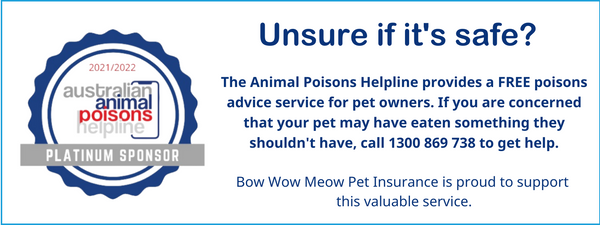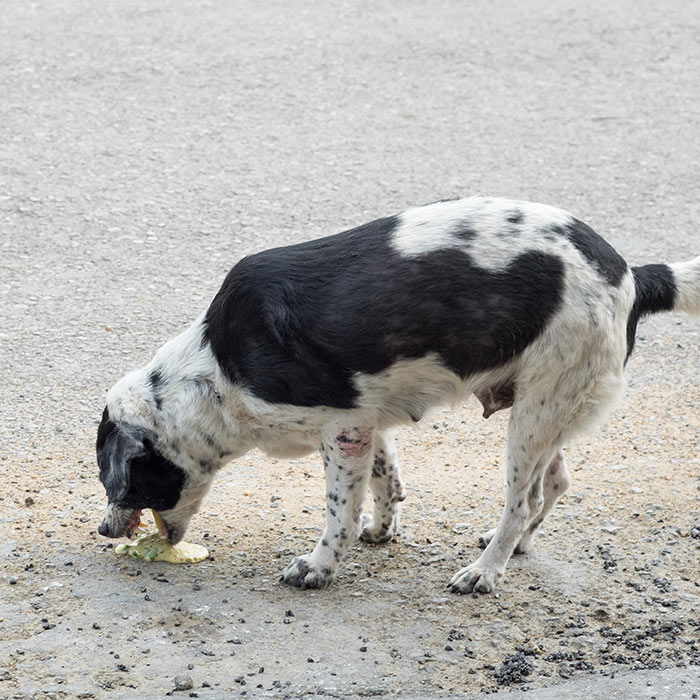Intoxication (poisoning) in dogs and cats
There are many common household substances that can be poisonous for dogs and cats, including insecticides and rodenticides, household chemicals, medications, certain plants and some human foods. If an animal ingests, absorbs or inhales a sufficient amount of the toxic substance, it will cause a toxic response in the body. Signs of poisoning in dogs and cats can range tremendously based on the particular toxin and its effects on the animal. Some of the more common signs include unexplained vomiting, diarrhoea, drooling, hyperactivity, muscle tremors, shock, seizures and coma.
Diagnosis and treatment can be difficult if the toxin is not known and/or onset of signs is delayed. Recovery will depend on the type of poison, the amount that was ingested, and the immediacy of treatment. If left untreated, many types of poisoning can be fatal. There are several treatment options for poisoning, including administering antidotes (medicines that counteract the effects of poisons), flushing the toxin from the system and supportive behaviour to alleviate symptoms. However, prevention of poisoning where possible is the best form of management.
Read on to learn more about intoxication (poisoning) in dogs and cats, or jump ahead to Symptoms of intoxication (poisoning) in dogs and cats, Causes of intoxication (poisoning) in dogs and cats, How is intoxication (poisoning) in dogs and cats diagnosed, Prognosis, Treatment for intoxication (poisoning) in dogs and cats, and Prevention.
What is intoxication (poisoning)?
A poison or toxin is a substance that can cause severe damage or death if eaten, breathed in, injected or absorbed through the skin. Dogs and cats are typically poisoned by ingesting, inhaling or even having skin contact with substances commonly found around the home. An animal’s natural curiosity and desire to explore can unwittingly lead to a serious intoxication.
Some of the most dangerous toxins for dogs and cats are:
- Foods and medications used by humans
- Insecticides and rodenticides
- Household chemicals and cleaning products
- Garden and indoor plants

Poisons work by causing damaging chemical reactions or activities within the molecules, cells or organs of the body. For poisoning to occur, a sufficient dosage of a toxic chemical must enter the body and accumulate in the cells of the target tissue or organ. The ensuing injury to the cells disrupts their normal structure or function. Symptoms and toxic signs then develop, and, if the toxicity is severe enough, death may result.
Poisons can elicit various types of toxic responses with the body, including:
- Attacking the blood cells, causing internal bleeding
- Disrupting important cellular functions
- Targeting the central nervous system, affecting the brain and the heart
- Targeting the lungs, liver and/or kidneys, slowly shutting each organ down
Poisons can be natural (e.g. a snake’s venom, a plant) or synthetic (e.g. insecticides, drugs). The concept of ‘dose’ is important; whether a drug has a therapeutic or toxic effect on the body depends on the amount ingested. Some seemingly innocuous substances, such as water, can be toxic if too much is consumed. Another important condition of exposure is frequency; exposure to the toxin may be acute (a single exposure), sub-chronic (repetitive exposures over a short period) or chronic (ongoing repetitive exposures over a long period of time).
While the incidence of poisoning in cats and dogs is similar, cats are often less likely to recover from poisoning than a dog might be, for a number of reasons:
- Their size – as they are generally smaller animals, even a small dose of a poison can be fatal
- Grooming – cats frequently groom themselves, thereby ingesting any toxic substances from their coats (for e.g. airborne toxins such as insecticides or plant material that they have brushed against)
- They process chemicals differently – cats have different biological mechanisms from dogs and in some cases are less able to safely eliminate a toxic substance from their body
- Outdoor lifestyle – owners are not always aware that a cat has been poisoned, or what the toxic substance might be
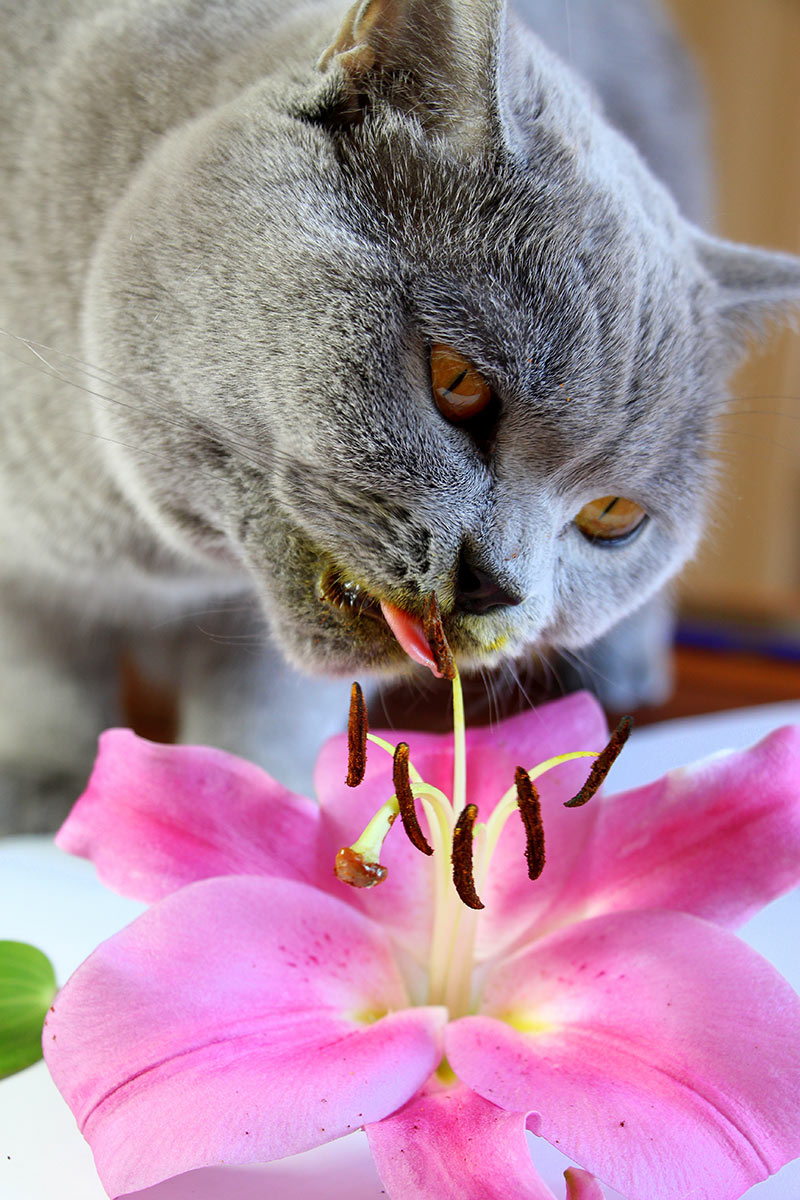
Symptoms of intoxication (poisoning) in dogs and cats
There is no one set of symptoms that definitively indicates poisoning. Rather, poisoning is usually just one of many possible causes for a range of symptoms a dog or cat may exhibit. Unfortunately, the majority of dog and cat poisoning cases occur when the owner is not present to witness the event, and the incidence of symptoms would be the only indication that anything untoward has occurred.
The many different types of poisoning have various symptoms. Some poisons will have immediate effects upon swallowing while others may take several days to manifest symptoms. Depending on which active ingredient the toxin contains and how much was ingested or inhaled, symptoms may include gastrointestinal and neurological problems, cardiac and respiratory distress, coma, and even death.
Gastrointestinal symptoms:
- Abdominal pain
- Vomiting (with or without blood)
- Diarrhoea (with or without blood)
- Excessive salivation (drooling)
- Loss of appetite (inappetence)
- Nausea
Respiratory symptoms:
- Coughing
- Laboured breathing
- Sneezing
- Rapid breathing
- Increased heart rate
- Lethargy, weakness to the point of being unable to move
- Skin swelling or inflammation
Neurological symptoms:
- Depression
- Excitability
- Nervousness
- Hyperactivity
- Irregular heart beat
- Behaviour may change from calm to anxious or excited
- Incoordination or unsteady gait
- Muscle tremors
- Shock
- Seizures
- Coma, loss of consciousness
Symptoms of internal bleeding:
- Coughing of blood
- Vomiting blood
- Pale or yellowish gums
- Bruising
- Blood in the stool
- Nosebleeds
- A racing heart rate
- Weakness or lethargy
- Anaemia
- Collapse
Symptoms associated with kidney failure:
- Halitosis (“uremic” breath)
- Loss of appetite (inappetence)
- Vomiting
- Diarrhoea
- Excessive thirst (polydipsia)
- Excessive urination
- Absence or decreased urination
- Lethargy
- Depression
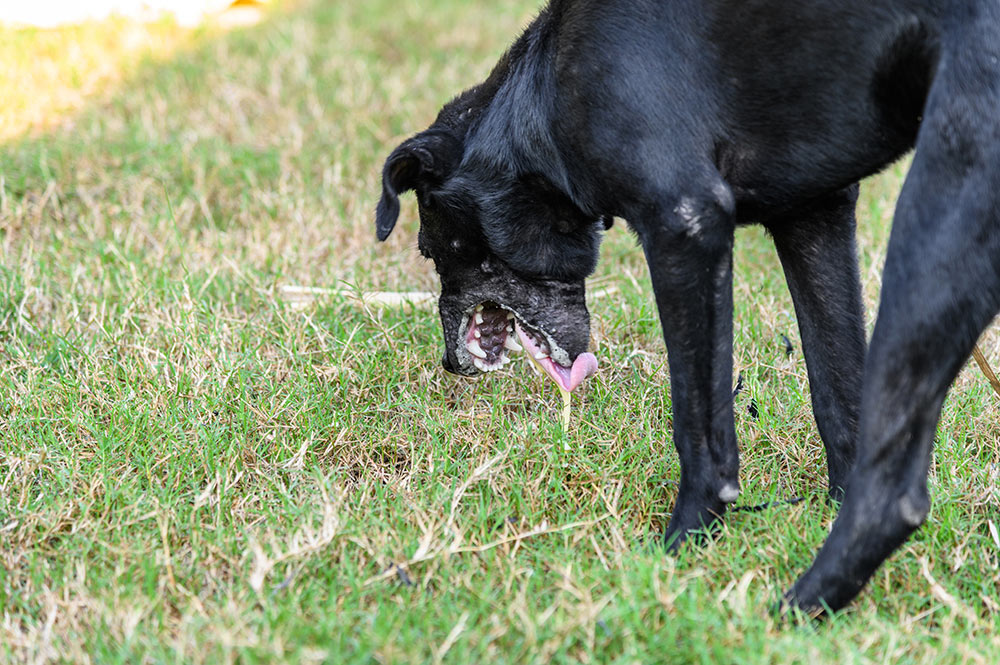
Symptoms associated with liver failure:
- Jaundice, yellow discoloration of the skin and the gums
- Weakness
- Collapse
- Acting abnormally
- Vomiting
- Diarrhoea
- Black-tarry stool (melena)
Because it is difficult to predict the costs of veterinary care, it can help to have measures in place to help prepare for the unexpected. Pet insurance can help by covering a portion of the eligible vet bill if the unexpected does happen.
Get a quote for 2 months free pet insurance for your puppy or kitten in their first year.
Causes of intoxication (poisoning) in dogs and cats
Common causes of poisoning in dogs and cats include:
Drugs / medications:
In cases of dog poisoning, the most common cause is unintentional overdosing of medications. Drug poisoning, also a common problem for cats, may occur through the misguided intentions of an owner, such as giving an animal an over the counter pain medication designed for humans. It also frequently occurs through accidental ingestion from a pill bottle left open or a lid chewed off by the animal, in which case a more severe overdose is likely to occur.
Veterinary medications are prescribed to help animals, yet cases of poisoning by veterinary drugs are not uncommon. Some of the more commonly reported problem medications include painkillers and de-wormers. However, many different veterinary drugs can cause poisoning when they are not given exactly as prescribed or when the animal accesses the container and consume them unbeknownst to the owner.
Human medications can be toxic to animals at certain doses. Any amount of a medication designed for humans, either prescribed, over-the-counter, or “recreational”, can have adverse effects on an animal because of its lower body weight and differences in metabolism. While it is best to assume all human medications are poisonous to dogs and cats and could have serious consequences, medications that should not be given to a dog or cat as they can be potentially lethal, even in small doses, include:
- Prescription anti-inflammatory and pain medications, including aspirin, paracetamol and ibuprofen, can cause vomiting, diarrhoea, bleeding from the gut, stomach ulceration and kidney failure.
- Antidepressants can cause vomiting and lethargy with certain types leading to serotonin syndrome (a dangerous condition that elevates temperature, heart rate, and blood pressure, and may cause seizures
- ADHD medications act as a stimulant and dangerously elevate heart rate, blood pressure and body temperature
- Seizure and anxiety medication
- Anti-diabetics cause a major drop in blood sugar levels causing disorientation, lack of coordination and seizures
- Cold medicines act as a stimulant causing elevated heart rates, blood pressure, body temperature and seizures
- Vitamin D exists in many forms and is found in a variety of products, such as psoriasis treatments. Poisoning can cause vomiting, diarrhoea, bleeding from the gut, convulsions, abnormal heart rhythm and kidney failure. Effects may be delayed for several days and may be permanent.
- Muscle relaxants can impair the central nervous system and lead to death
- Sleep aids
- Birth control pills
- Diet pills
- Heart and blood pressure medication
- Medications to lower cholesterol
- Chemotherapy drugs
- Some topical agents
- Herbal and nutraceutical products (e.g. fish oil, joint supplements)
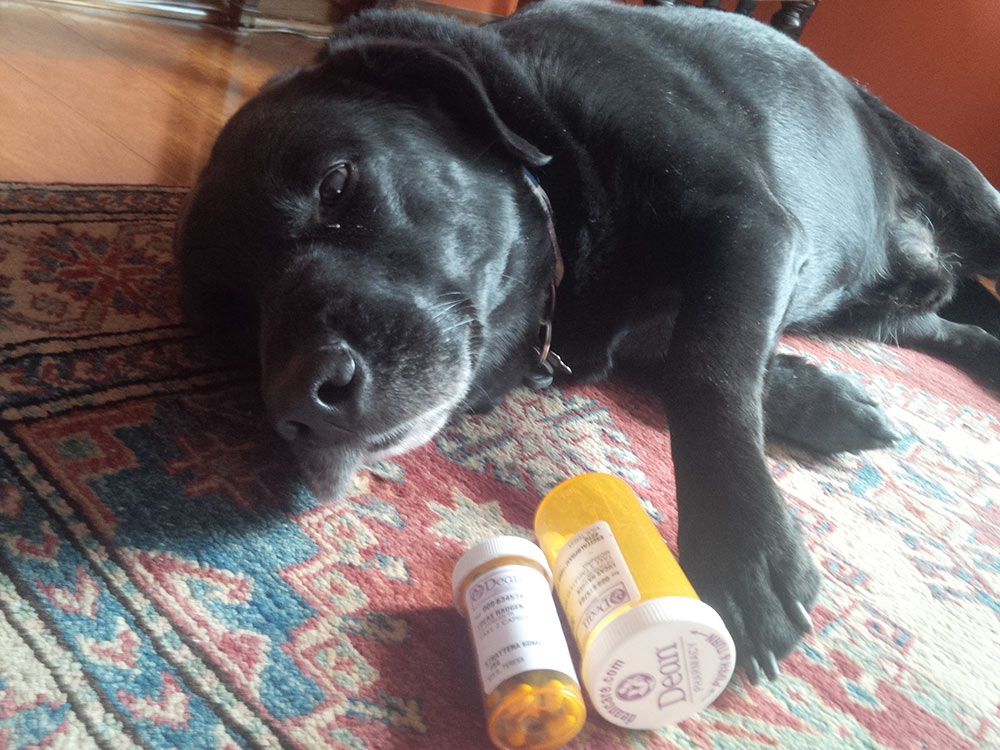
Source: https://www.wired.com/images_blogs/wiredscience/2014/03/IMG_20140320_155724.jpg
Common household hazards:
- Household cleaners – Detergents and bleach are a leading cause of pet poisoning, resulting in stomach and respiratory tract problems.
- Pool chemicals – the symptoms that may result include stomach upset, depression, chemical burns, renal failure and death.
- Ant baits – These contain boric acid which is toxic to dogs and cats if a large amount is ingested. They have a sweet smell and taste to attract ants which is also attractive to pets.
- Antifreeze (ethylene glycol) – A common cause of poisoning in colder climates, as animals find its smell and taste appealing.
- Fertilisers – These generally contain varying amounts of nitrogen, phosphorous and potassium compounds and contain additives such as herbicides, insecticides and fungicides. As they are usually a combination of ingredients, the effects of ingestion may vary from mild to moderate gastrointestinal irritation (vomiting, diarrhoea, hypersalivation and abdominal pain) to more severe if a larger amount is ingested and they may also be caustic, causing irritation and burning of the lining of the gastrointestinal tract.
- Lead poisoning – May occur from ingestion of lead-containing dust or paint when grooming a contaminated coat. Chronic, low level, lead poisoning may cause vomiting, abdominal pain, anorexia and diarrhoea while acute poisoning may cause convulsions, blindness and tremors.
Pet insurance provides peace of mind and protection in the event that your pet is ever poisoned.
Find out more about our dog insurance options
Pesticides:
Rodenticides
With a mouse plague affecting parts of eastern Australia, the Animal Poisons Helpline has teamed up with Dr Lisa Chimes to remind pet owners about the risks of using rat and mouse baits around our pets and encourage safe use of these baits. This video explains more about the dangers and how to avoid them:
Rat and mouse poisons are fast acting because their chemicals attach to the blood cells and spread throughout the body. Depending on the active ingredients found in these poisons, they work in different ways and clinical signs will vary, therefore it is important to check which type has been ingested:
- Anticoagulant rodenticides or “ACRs” (including warfarin) – Affect the blood’s ability to clot properly, thereby causing uncontrollable bleeding. These are the most common type of rat poison and therefore are a common cause of dog and cat poisoning. ACRs inhibit the production of Vitamin-K dependent blood clotting factors (made in the liver), so when ingested in toxic amounts by dogs or cats, it can result internal bleeding. Signs of rodenticide ingestion appear one to four days after ingestion, they include depression, weakness, coughing and staggering. As well as eating the ACR itself, eating a poisoned rodent can poison a dog or cat.
- Cholecalciferol (Vitamin D3)- One of the most potent mouse and rat poisons on the market, it results in an increased amount of calcium in the body, leading to kidney failure. Only a small amount can result in severe poisoning in both dogs and cats.
- Bromethalin – A neurotoxic rodenticide that damages the central nervous system, it is becoming one of the more common active ingredients seen in rodenticides. It causes swelling of the brain which results in neurological symptoms when ingested in toxic amounts.
- Phosphides – Typically used to kill slightly bigger creatures like moles and gophers (and less commonly used as an active ingredient in mouse or rat poisons). When ingested, the phosphides product a toxic gas in the stomach called phosphine gas.
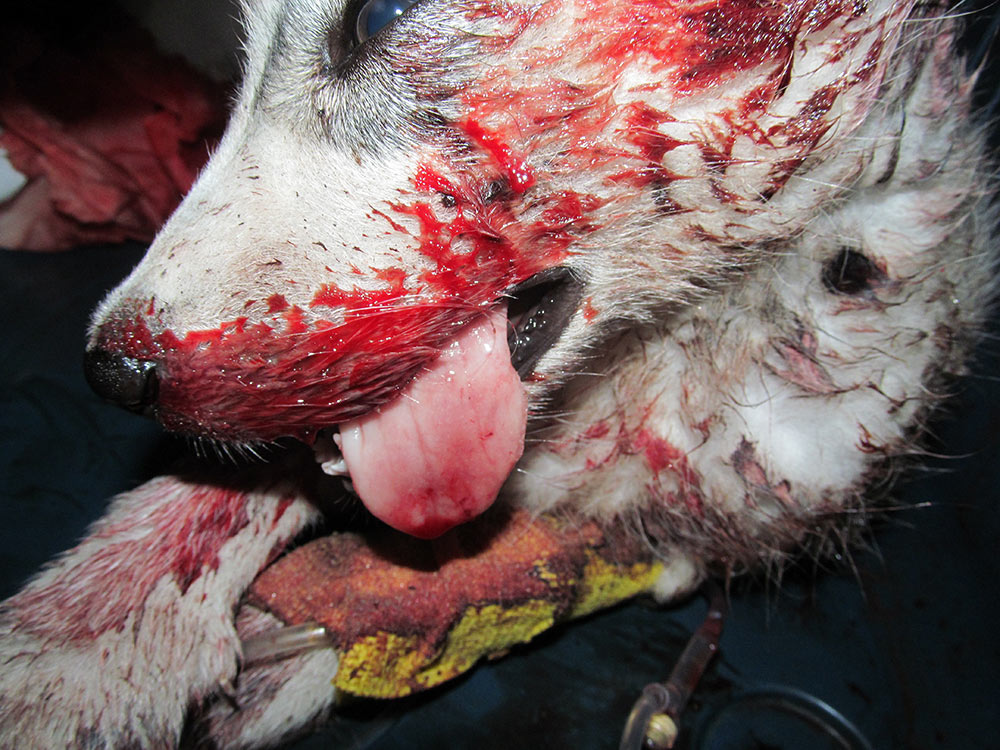
Insecticides
These usually contain organophosphates and carbonates which are highly toxic to dogs and cats. Signs of ingestion include vomiting, diarrhoea, hypersalivation, muscle tremors and seizures.
Molluscacides
Snail and slug baits come in a variety of forms and may contain a number of toxins. Metaldehyde is a common ingredient of slug and snail baits or pellets. However, not all slug baits contain metaldehyde; it is important to check which type has been ingested. Metaldehyde poisoning is extremely serious – ingestion can be fatal and there is no antidote. The effects of poisoning include anxiety, elevated heart and respiratory rates, incoordination, severe muscle tremors, continuous convulsions, possible respiratory failure and death.
Flea and tick products
Many pets are unintentionally poisoned by these products every year, whether in the form of pills, collars, sprays, spot on treatments or shampoos. Poisoning can occur if an animal accidentally ingests these products or if small animals receive excessive amounts. Using dog products on cats can be dangerous for the cat, as they may contain chemicals such as Permethrin that is tolerated by dogs but poisonous for cats.
Human foods:
Some foods that are perfectly safe for humans can be dangerous, and even fatal, for dogs and cats.
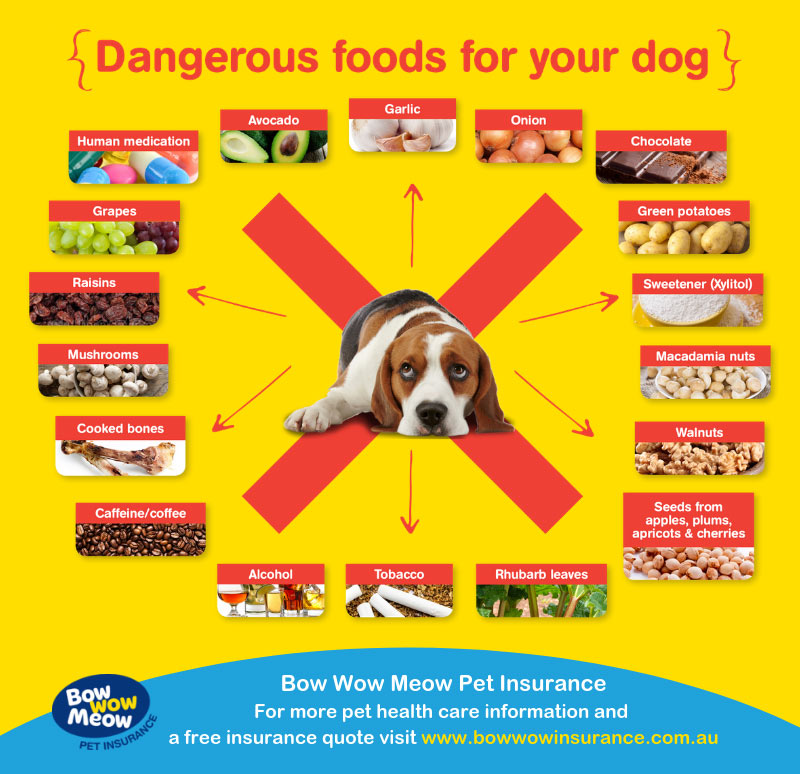
Chocolate: Chocolate contains a stimulant called theobromine, as well as caffeine, which can be toxic to the animal’s heart and nervous system. Dogs and cats cannot metabolise theobromine and caffeine as well as humans can, making them more sensitive to the chemicals’ effects. Toxicity is dose related meaning that the overall effect of chocolate ingestions depends on the size of the animal, the amount eaten and the type of chocolate. Dark chocolate, cocoa mulch and cocoa contain high levels of theobromine; the darker and more bitter the chocolate, the more dangerous it is. While rarely fatal, chocolate ingestion can result in significant illness. Symptoms include vomiting, diarrhoea, dehydration, hyperactivity, high temperature and blood pressure, abnormal heart rhythm and tremors.
Avocados: They contain persin, a fungicidal toxin that leaches into the flesh of the fruit from the seeds; it can cause gastrointestinal irritation, vomiting, diarrhoea, respiratory distress, congestion, fluid accumulation around the tissues of the heart and even death.
Grapes, sultanas, currants and raisins: The toxic substance is unknown, but ingestion of even a small number can result in vomiting and diarrhoea and lead to kidney failure.
Alcohol: Alcohol contains ethanol which can cause symptoms of alcohol poisoning in animals similar to those in people, including intoxication, gastrointestinal irritation, respiratory distress vomiting, coma and, in severe cases, death.
Xylitol: A sweetener used in many products, including sugar-free gum and candy. It causes a rapid drop in blood sugar, resulting in weakness and seizures. Liver failure also has been reported in some dogs.
Salt: Large amounts of salt can produce excessive thirst and urination, and even sodium ion poisoning. Signs that a dog or cat has consumed too much salt include depression, tremors, elevated body temperature and seizures.
Caffeine products: Coffee, tea and caffeinated beverages can be fatal in large enough doses, and there is no antidote. Symptoms of caffeine poisoning include restlessness, rapid breathing, heart palpitations and muscle tremors.
Onions, Garlic and Chives: These contain a substance that can cause gastrointestinal irritation, vomiting, abdominal discomfort and lethargy and lead to red blood cell damage and a form of anaemia.
Green tomatoes and raw potatoes: these contain a substance that causes violent gastro-intestinal problems.
Cherries: can cause cyanide poisoning in large quantities
Mushrooms: some varieties can cause shock and even death
Walnuts and macadamias: can lead to nervous system and muscle damage
Plants:
There are many plants that are poisonous to dogs and cats. Consumption of these plants can cause a range of symptoms from vomiting and diarrhoea to serious illness and even death. Symptoms of poisoning may not occur until a few days after the incident. Generally, dogs will stay away from plants but occasionally curiosity or boredom will entice them to nibble at one that happens to be toxic. Indoor cats do tend to chew on decorative house plants, as they do not have the opportunity to ease stomach nausea through the consumption of grass.
Some of the more toxic plants to dogs and cats include:
Lilies – most varieties including tiger, day, Easter and red – the entire plant (pollen, petals, stems and leaves) is highly toxic to cats especially, even if a very small amount is ingested or mouthed; even the water in the vase can cause poisoning.
and death can result.
Azaleas and rhododendrons – these pretty flowering plants contain toxins that may cause vomiting, diarrhoea, coma, and potentially even death.
Tulips and daffodils – the bulbs of these plants may cause serious stomach problems, difficulty breathing, and increased heart rate.
Sago palms – eating just a few seeds may be enough to cause vomiting, seizures, and liver failure.
Marijuana / cannabis plant – the central nervous system can be depressed; they may drool excessively, have gastrointestinal problems, a rapid heart rate, and possible seizures leading to a coma.
Other toxic plants – Ferns, ivy, jasmine, oleander, foxglove, yew, wisteria, ivy, chrysanthemum, autumn crocus, buttercups, sweet pea, poppy, peony, marigold, delphinium, iris, cornflower, hyacinth and many more.
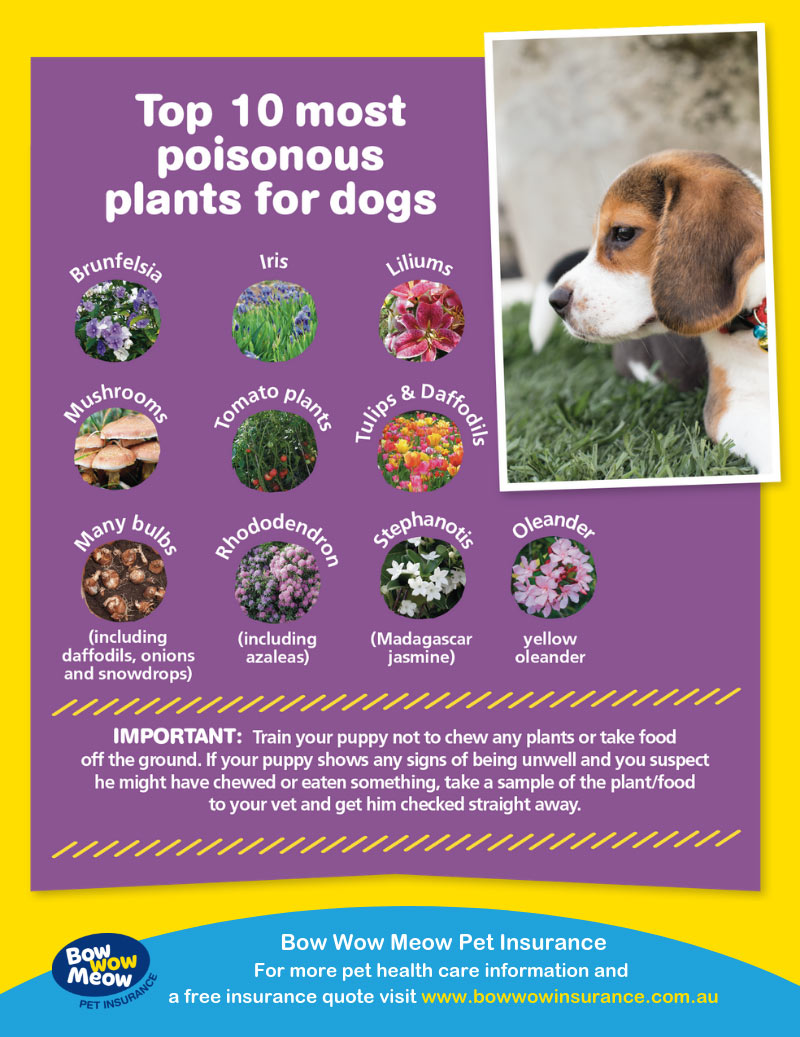
How is intoxication (poisoning) in dogs and cats diagnosed?
Poisons and toxic substances come in many forms, and it is often difficult to give an exact diagnosis if the substance is not known and identified. The best way to determine the cause of poisoning is by actually observing the animal eating the substance; unfortunately, in most cases there is no witness to the poisoning.
Symptoms usually appear suddenly, and it is important to act quickly without waiting for further signs of illness. Contact the veterinarian as soon as possible for advice. Look for evidence of any toxin in the environment that could be the cause and take a sample to assist the veterinarian with the diagnosis. If a medication appears to have been ingested, take the entire container with so that the veterinarian can ascertain the active ingredients and dosage; this will speed up treatment and recovery. If the animal has vomited, collect a sample in a sealable plastic bag. Make a note of the timeline of events (when symptoms were first noticed, when additional symptoms occurred, etc).
The veterinarian may suspect a diagnosis of poisoning based on the physical signs and symptoms and may order tests to definitively confirm the diagnosis. If it is unclear as to what was ingested, the animal’s symptoms will be treated as they become obvious. A blood work-up and urine tests will be performed to try to determine the exact cause of the poisoning and to assess the animal’s overall health, as well as to check blood oxygen levels and ascertain the degree of the toxicity. The veterinarian will examine your dog for vital signs, including blood pressure, heart rate and body temperature. As many toxins can lead to kidney or liver failure, additional tests may be done to determine the functionality of these organs.
If immediate access to a veterinarian is unavailable, calling a poison control hotline for dogs and cats can be helpful.
If you suspect your pet has been poisoned, call the Animal Poisons Helpline on 1300 869 738 (AU) or 0800 869 738 (NZ)
Describe the details to the operator, including what substance it appears the animal has ingested, how much and when it occurred. Follow any instructions you are given exactly and get the animal to an emergency treatment facility as soon as possible.
Prognosis
Prognosis depends on the type of toxic substance, the dose ingested, and the time taken to obtain treatment. The age, size and overall health of the animal are also important factors in recovery. The sooner treatment begins, the less time the poison has to make its way through the animal’s system. In most cases, with prompt and aggressive treatment, the prognosis is fair to excellent, with most animals returning to their normal selves within a short time.
Any case of poisoning can have serious consequences. While mild cases are reversible, severe overdose can cause long term damage or death. This is especially true of medications that were intended for humans, from which serious illness and even death can result. Cases where the poisoning was not discovered until later or the cause is unknown can delay treatment and lead to more severe consequences.
Treatment of intoxication (poisoning) in dogs and cats
The goal of treatment is to neutralise the toxic substance to prevent further absorption into the body, and to provide supportive measures to the animal to facilitate recovery. There are several treatment options to assist in the removal of the toxic substance and the rehabilitation of your dog or cat, including administering any known antidote and supportive behaviour to stabilise the animal and alleviate symptoms.
Unsure how serious it is?
Bow Wow Meow policyholders can get access to trusted vet care anytime, anywhere, at no additional cost. Connect to an experienced Australian registered vet via video call, 24/7. Whether it’s providing vet advice, setting up at-home treatment plans, or confirming if you need to visit a vet in person, you can get help when you need it.
Find out more about our pet insurance cover options.
Treatment for rodenticide poisoning
Antidotes are medicines that counteract the effects of particular poisons. If a specific antidote for a confirmed poisoning is available, it will be used. Anticoagulant rodenticides (ACRs) inhibit the production of Vitamin-K dependent blood clotting factors (made in the liver), and when ingested in toxic amounts by dogs or cats, can result internal bleeding and subsequent death. The antidote is vitamin K1, a prescription medication readily available at the veterinarian. Treatment protocol includes decontamination, Vitamin K1 administered orally (typically for 30 days), blood transfusions, plasma transfusions, oxygen, and supportive care.
Cholecalciferol (Vitamin D3) poisoning results in an increased amount of calcium in the body, leading to kidney failure. Only a small amount can result in severe poisoning in both dogs and cats. Unfortunately, this toxin has no antidote, and is very expensive to treat, with animals typically need to be hospitalized for 3-7 days on aggressive therapy. Treatment includes aggressive IV fluids to flush the calcium and kidney poisons out, medications to help decrease the body’s calcium level and on-going monitoring with frequent blood work.
Bromethalin poisoning causes brain swelling (e.g., cerebral oedema); there is no antidote. Treatment includes inducing vomiting, administering activated charcoal, IV fluids, anti-seizure medication, muscle relaxants and supportive care.
Phosphide poisoning is less common in dogs and cats but is also poisonous to humans who come into contact with a poisoned animal, including owners and veterinary staff. When ingested, the phosphides product a toxic gas in the stomach called phosphine gas. Treatment includes anti-vomiting medication, antacids, IV fluids, and supportive care. Food is withheld because if there is food in the stomach, more phosphine gas is produced, and the poisoning worsens.
Treatment for chocolate poisoning
Treatment depends on the amount and type of chocolate eaten. If treated early, removal of the chocolate from the stomach by administering medications to induce vomiting and administration of activated charcoal to block absorption of theobromine into the body may be all that is necessary. Activated charcoal may be administered every four to six hours for the first twenty-four hours to reduce the continued resorption and recirculation of theobromine.
Depending on the severity of the poisoning, it may be necessary to administer intravenous fluid therapy to help stabilize the animal and promote theobromine excretion. All dogs ingesting chocolate should be closely monitored for any signs of agitation, vomiting, diarrhoea, nervousness, irregular heart rhythm, and high blood pressure. Medications may be necessary to slow the heart rate or to treat an arrhythmia.
Supportive treatment
The dog or cat will generally need to stay in a veterinary hospital at least overnight and probably for several days, to ensure that all the systems have returned to normal.
Depending on the type of poison and the resulting symptoms, supportive treatment may entail one or more of the following:
- For poisoning that occurred recently, the veterinarian may induce vomiting or have the animal’s stomach pumped to limit further absorption.
- Gastric lavage (internal washing) entails using a tube passed into the stomach and filled with water to flush the system, allowing the substance to be washed directly from the stomach.
- Fluids are given in almost all cases of drug poisoning as these help to maintain blood pressure, as well as diluting the drug and flushing it out of the system faster.
- Diuretic drugs will enhance the secretion of the substance through the urinary tract.
- Activated charcoal is an agent that binds with the toxin and prevents it from being further absorbed by the body. It is given orally to absorb any toxin still in the gut and is often given if the poisoning occurred within the previous few hours. Drugs which have a delayed release may need several doses of charcoal administered over a longer period.
- External oils may be used to prevent absorption into the skin as the substance passes through the body.
- For serious conditions, filtering of the kidneys with a dialysis machine may be recommended to remove the substance from the animal’s blood and kidneys.
- Depending on the type of drug that was ingested, medications may be given to support heart or respiratory function.
- If the animal is unable to breathe, an emergency airway must be established quickly to prevent asphyxiation.
- If the heart has stopped, cardiopulmonary resuscitation (CPR) or massage of the heart (cardiac massage) may be required to regain a proper heartbeat.
- Central nervous system symptoms such as seizures, tremors, or excessive agitation will also need to be controlled.
- Vital signs will be monitored regularly, and treatment will be adjusted to control the symptoms until the drug is completely flushed out.
- Various medications may be prescribed to alleviate particular symptoms.
- Repeated testing and bloodwork will be undertaken to monitor progress.
Once the symptoms start to resolve and the animal is out of danger, she will be sent home to continue recuperating. She may need to continue taking medications or be placed on a special diet until she is completely recovered. Fluid therapy may be recommended to keep her hydrated.
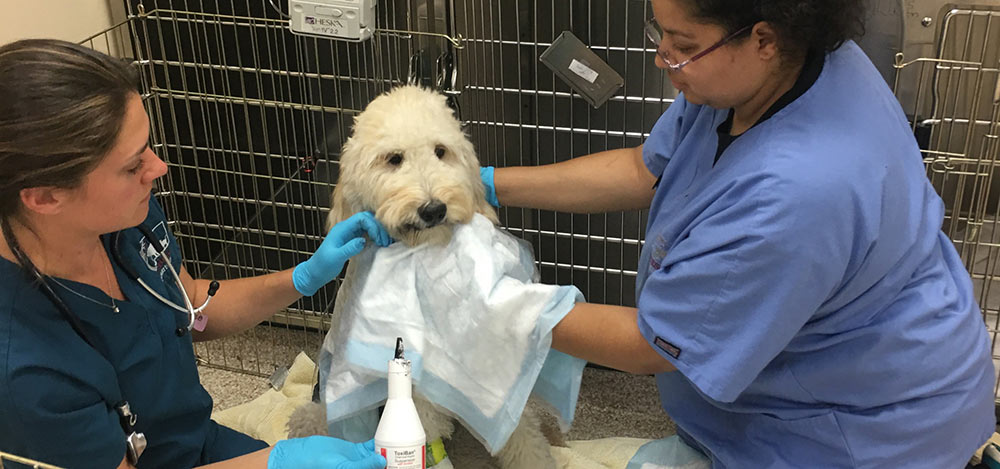
Source: https://leesburgvetblog.files.wordpress.com/2018/01/ellie-2-e1516465499959.jpg?w=2560&h=1200&crop=1
Prevention
Prevention of poisoning is the best form of management.
- Always administer only the prescribed dose of a medication.
- Never give an animal any medication that was designed for humans.
- Keep medications in a locked cabinet, or on a high shelf which the animal cannot reach.
- Do not leave bottles or tubes lying around even if they are sealed or appear to be empty.
- If you drop a pill on the floor, be sure to pick it up immediately.
- Supervise anyone, such as the elderly, who may need help taking medications.
- Keep household chemicals, cleaners and all other hazardous materials in the proper containers, carefully sealed and stored in pet-inaccessible places.
- Do not leave containers out in any place the animal can get to or where they might be knocked to the floor.
- Clean up spills immediately.
- Always follow guidelines on flea or tick products.
- Avoid giving human foods to animals, rather give treats made specifically for animals.
- Keep foods that are toxic to animals out of reach or locked away.
- Keep any insecticides and rodenticides in metal cabinets or high on shelves where your pets can’t find them.
- Use these products with caution – your pet can be poisoned by eating or mouthing a poisoned rat, mouse or other creature.
- When buying plants for your home, opt for those that are not toxic for dogs or cats. If you choose to have toxic plants, be sure they are kept in a place where your animals can’t reach them.
In summary
Poisoning occurs when a dog or cat ingests, absorbs or inhales a foreign material that causes a toxic reaction. There are several common household substances that are often implicated in poisoning of dogs and cats, including insecticides and rodenticides, animal medications, human medications, toxic plants and particular human foods.
Signs of poisoning in dogs and cats can range tremendously based on the underlying toxin and its systemic effects. Some common symptoms include unexplained vomiting, diarrhoea, drooling, hyperactivity, muscle tremors, shock, seizures and coma. Diagnosis can be difficult if the toxic substance is not known.
Recovery will depend on the drug, the amount that was ingested, and the immediacy of treatment. Cases where the poisoning was not discovered until later or the cause is unknown are much harder to treat. There are several treatment options to assist in the removal of the toxic substance and the rehabilitation of the animal, including administering antidotes, flushing the toxin from the system and supportive behaviour to alleviate symptoms. If left untreated, many types of poisoning can be fatal.
If you suspect your pet has been poisoned, call the Animal Poisons Helpline on 1300 869 738 (AU) or 0800 869 738 (NZ)
Bow Wow Meow Pet Insurance can help protect you and your pet should an unexpected trip to your vet occur.
- Find out more about our dog insurance options
- Find out more about our cat insurance options
- Get an instant online pet insurance quote

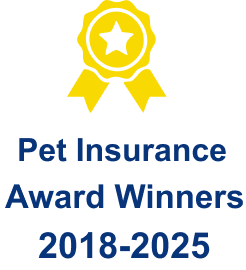
More information
- https://pets.webmd.com/dogs/guide/top-10-dog-poisons#1
- https://pets.webmd.com/cats/guide/top-10-cat-poisons
- http://agriculture.vic.gov.au/pets/dogs/dog-health/toxic-plants-for-dogs
- https://www.petmd.com/dog/conditions/toxicity/c_multi_poisoning
- https://www.petmd.com/cat/conditions/toxicity/c_ct_poisoning
- https://www.rspca.org.uk/adviceandwelfare/pets/dogs/health/poisoning
- https://www.petpoisonhelpline.com/pet-owners/basics/signs-of-poisoning-in-dogs-and-cats/
- https://www.caninejournal.com/dog-poison-symptoms/
- http://www.pethealthnetwork.com/dog-health/dog-toxins-poisons/dangers-rat-poison-dogs-and-cats
- https://vcahospitals.com/know-your-pet/chocolate-poisoning-in-dogs
- http://www.sydneyanimalhospitals.com.au/dog-chocolate-toxicity
- https://wagwalking.com/condition/drug-poisoning
- https://www.petmd.com/cat/emergency/poisoning-toxicity/e_ct_swallowed_poisons
- https://wagwalking.com/cat/condition/poisoning
- https://www.cats.org.uk/poisoning
- https://www.rspca.org.uk/adviceandwelfare/pets/dogs/health/poisoning/common
- https://bluebuffalo.com/articles/pets/plants-that-are-poisonous-to-pets/
- https://www.petmd.com/dog/emergency/digestive/e_multi_drug_poisoning

